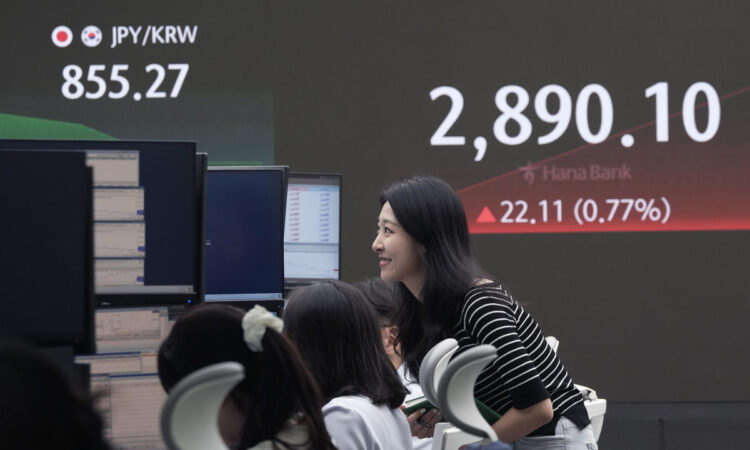
Asian shares advanced Thursday, tracking a blistering rally on Wall Street, with Japan’s Nikkei 225 index surging over 42,000 for the first time.
On Wednesday, the U.S. stock market vaulted to more all-time highs, led by big technology companies whose shares have been soaring thanks to the frenzy over artificial intelligence.
Hopes for cuts to interest rates also have pushed markets higher.
The Nikkei 225 jumped 0.8% to 42,179.84, again surpassing its all-time high after closing at records on Tuesday and Wednesday.
The Hang Seng in Hong Kong climbed 1.1% to 17,667.58.
The Shanghai Composite index was up 0.7% at 2,959.25, while the Kospi in Seoul gained 0.8% to 2,891.34.
Australia’s S&P/ASX 200 rose 1% to 7,894.30. Taiwan’s Taiex advanced 1.1% as Taiwan Semiconductor Manufacturing Corp. jumped 2.4%.
TSMC’s U.S.-listed shares rose 3.5% after it said its revenue climbed nearly 33% in June from a year earlier. The company makes chips for Nvidia and others that have been driving the business world’s rush into artificial-intelligence technology.
The promise of big profits in the future from AI has sent Nvidia in particular to breathtaking heights over the last year, and Nvidia rose another 2.7% Wednesday to bring its gain for the year so far to 172.5%. It was again the strongest single force pushing the S&P 500 upward as the rally on Wall Street stretched into a seventh day as big technology companies led the way.
The S&P 500 jumped 1% and topped the 5,600 level for the first time, closing at 5,633.91.
The Nasdaq composite rallied 1.2% to 18,647.45, and the Dow Jones Industrial Average gained 1.1% to
Advanced Micro Devices was another major force behind the stock market’s leap, and it jumped 3.9% after announcing a $665 million deal to buy Silo AI, a European AI lab.
Markets have been knocking down records despite a slowing U.S. economy and a tightening squeeze on lower-income households.
Hopes that inflation is slowing enough for the Federal Reserve to deliver much-sought cuts to interest rates later this year are also driving buying enthusiasm.
Fed Chair Jerome Powell returned to Capitol Hill to give testimony about interest rates, where he echoed many of his comments from a day before. He said he was “not sending any signals” about when cuts to rates could arrive, but he pointed out the downsides of being too late on them.
“More good data would strengthen our confidence” and clear the way for a cut, Powell said.
Much of Wall Street is expecting the Fed to begin cutting its main interest rate in September, but traders have a long history of jumping the gun. Powell acknowledged a recent improvement in inflation but reiterated the Fed is not confident inflation is sustainably heading toward its goal of 2%.
Later Thursday, the U.S. government will release the latest monthly update on inflation. Economists expect it to show U.S. consumers paid prices for food, airline tickets and everything else that were 3.1% higher in June than a year earlier. That would be a touch slower than May’s 3.3% inflation rate.
“With the Federal Reserve … wanting to see ‘more good data,’ the US inflation print will play a significant role in validating if markets are getting ahead of themselves in pricing for a rate cut as early as September this year,” Yeap Jun Rong of IG said in a commentary.
Later this week will also bring the unofficial start to the latest earnings reporting season. Delta Air Lines, JPMorgan Chase and others will report how much profit they made during the spring from April through June, and the hope on Wall Street is for S&P 500 companies to deliver the strongest growth in more than two years.
In other dealings, U.S. benchmark crude oil gained 75 cents to $82.85 per barrel in electronic trading on the New York Mercantile Exchange.
Brent crude, the international standard, picked up 79 cents to $85.87 per barrel.
The U.S. dollar fell to 161.60 Japanese yen from 161.66 yen. The euro rose to $1.0839 from $1.0832.
___
AP Business Writer Stan Choe contributed.
